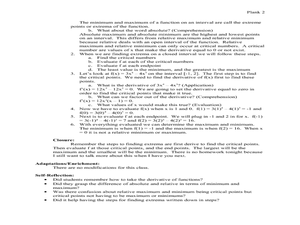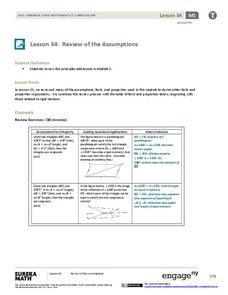Curated OER
Trig is SOH Easy!
Students derive the six trigonometric identities. In this trigonometry lesson plan, students review the parts of a right triangle and use the Pythagorean theorem as a guide to find the trig identities. They find sine, cosine and tangent...
EngageNY
Completing the Square (part 2)
Give classes confidence in completing the square with a resource that develops the process of completing the square of more complex problems, including fractions and values greater than one. It then uses quadratic modeling for...
Curated OER
Modeling Natural Disaster with Mathematical Functions
Ninth graders investigate the functional relationship of different environmental phenomena. In this math lesson, 9th graders create models of various natural disasters. They use logarithmic and exponential functions to interpret...
Curated OER
Modeling the Keeling Curve with Excel
In this modeling the Keeling Curve worksheet, high schoolers use given data beginning in 1960 to create a mathematical model for the changes in atmospheric carbon dioxide over time. Students manipulate the equation to predict the carbon...
Corbett Maths
Density
A short video introduces the triangle that illustrates how to find any value given the other two in the density formula. Class members use the triangle to work several problems to find the mass, volume, or density of an object.
Curated OER
Law of Sines
Students solve problems using sine and cosine. For this precalculus lesson, students ask questions about the Law of sines and its application to the real world. They derive the correct formula of sine for each problem.
Curated OER
The Quadratic Formula
Students solve quadratic function by completing the square. In this algebra lesson, students use the quadratic formula to factor quadratics and find the roots. They graph the parabola and identify its properties.
Curated OER
Kepler's Third Law
High schoolers use Kepler's third law to derive the velocity in a circular orbit of any radius, and identify the Earth escape velocity.
Curated OER
Transformations
Tenth graders recognize, perform and derive rules for basic transformations including translation, reflection and rotation. They also consider compositions, a combination of two or more basic transformations. Students explore both...
Curated OER
Worksheet #5, Concavity,
In this calculus worksheet, students determine the intervals in which a given relation is concave up. They determine the inflection points of a given formula. Students use the second derivative test to classify the relative extrema of a...
Curated OER
Extrema on an Interval
Students explore maximum and minimum points, slopes and tangents. In this Pre-Calculus lesson, students solve optimization problems and find rates of change.
Curated OER
Natural Disasters and the Five Themes of Geography
Have your class do research on natural disasters and create a presentation using this resource. In completing this activity, learners apply the five geography themes to their research. They write a paper describing their results. It's a...
Student Achievement Partners
Laura Hillenbrand's "Unbroken" and Jeanne Wakatsuki Houston and James D. Houston's "Farewell to Manzanar"
Passages from Unbroken and Farewell to Manzanar provide the context for a study of the historical themes of experiencing war, resilience during war, and understanding the lasting trauma of war. Appendices include extension...
Curated OER
Improve Your Spelling with the Visual Thesaurus
Using Visual Thesaurus software, class members participate in a computer-based spelling bee. Then they work in groups to analyze the words and use deductive reasoning to infer spelling patterns. They then present one of their "rules" to...
Curated OER
Farewell to Manzanar
Examine human resilience across two texts with a detailed unit. Over the course of a week, learners will conduct a close reading of excerpts from Unbroken and Farewell to Manzanar. The resource includes clear procedures for reading and...
EngageNY
Points of Concurrencies
You say that perpendicular bisectors intersect at a point? I concur! Learners investigate points of concurrencies, specifically, circumcenters and incenters, by constructing perpendicular and angle bisectors of various triangles.
EngageNY
Replacing Letters with Numbers
When did letters become the same as numbers? Scholars learn about substituting numbers for letters to evaluate algebraic expressions in the seventh part in a series of 36. The lesson focuses on expressions related to geometry, such as...
EngageNY
Logarithms—How Many Digits Do You Need?
Forget your ID number? Your pupils learn to use logarithms to determine the number of digits or characters necessary to create individual ID numbers for all members of a group.
EngageNY
Using Permutations and Combinations to Compute Probabilities
Now that we know about permutations and combinations, we can finally solve probability problems. The fourth installment of a 21-part module has future mathematicians analyzing word problems to determine whether permutations or...
EngageNY
Review of the Assumptions (part 2)
Is the amount of information getting overwhelming for your geometry classes? Use this strategy as a way to organize information. The resource provides a handout of information studied in relation to triangle congruence. It includes a...
EngageNY
Systems of Equations Leading to Pythagorean Triples
Find Pythagorean Triples like the ancient Babylonians. The resource presents the concept of Pythagorean Triples. It provides the system of equations the Babylonians used to calculate Pythagorean Triples more than 4,000 years ago. Pupils...
EngageNY
The Division Algorithm—Converting Decimal Division into Whole Number Division Using Mental Math
Make math much simpler with mental math methods. The 16th installment in a series of 21 looks at ways scholars can apply mental math to convert division problems into easier problems with the same quotient. Multiplying or dividing both...
EngageNY
Polynomial, Rational, and Radical Relationships
This assessment pair goes way beyond simple graphing, factoring and solving polynomial equations, really forcing learners to investigate the math ideas behind the calculations. Short and to-the-point questions build on one another,...
EngageNY
Applying Tangents
What does geometry have to do with depression? It's an angle of course! Learners apply the tangent ratio to problem solving questions by finding missing lengths. Problems include angles of elevation and angles of depression. Pupils make...























